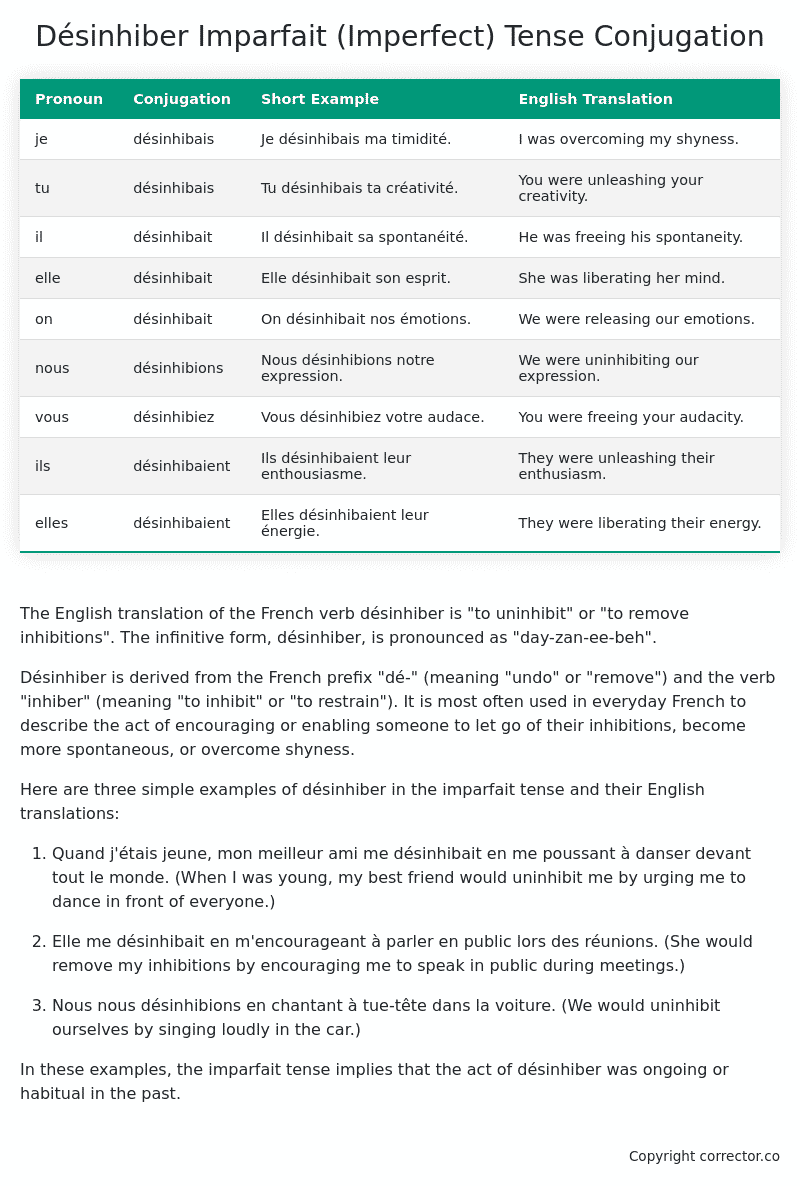Imparfait (Imperfect) Tense Conjugation of the French Verb désinhiber
Introduction to the verb désinhiber
The English translation of the French verb désinhiber is “to uninhibit” or “to remove inhibitions”. The infinitive form, désinhiber, is pronounced as “day-zan-ee-beh”.
Désinhiber is derived from the French prefix “dé-” (meaning “undo” or “remove”) and the verb “inhiber” (meaning “to inhibit” or “to restrain”). It is most often used in everyday French to describe the act of encouraging or enabling someone to let go of their inhibitions, become more spontaneous, or overcome shyness.
Here are three simple examples of désinhiber in the imparfait tense and their English translations:
-
Quand j’étais jeune, mon meilleur ami me désinhibait en me poussant à danser devant tout le monde.
(When I was young, my best friend would uninhibit me by urging me to dance in front of everyone.) -
Elle me désinhibait en m’encourageant à parler en public lors des réunions.
(She would remove my inhibitions by encouraging me to speak in public during meetings.) -
Nous nous désinhibions en chantant à tue-tête dans la voiture.
(We would uninhibit ourselves by singing loudly in the car.)
In these examples, the imparfait tense implies that the act of désinhiber was ongoing or habitual in the past.
Table of the Imparfait (Imperfect) Tense Conjugation of désinhiber
| Pronoun | Conjugation | Short Example | English Translation |
|---|---|---|---|
| je | désinhibais | Je désinhibais ma timidité. | I was overcoming my shyness. |
| tu | désinhibais | Tu désinhibais ta créativité. | You were unleashing your creativity. |
| il | désinhibait | Il désinhibait sa spontanéité. | He was freeing his spontaneity. |
| elle | désinhibait | Elle désinhibait son esprit. | She was liberating her mind. |
| on | désinhibait | On désinhibait nos émotions. | We were releasing our emotions. |
| nous | désinhibions | Nous désinhibions notre expression. | We were uninhibiting our expression. |
| vous | désinhibiez | Vous désinhibiez votre audace. | You were freeing your audacity. |
| ils | désinhibaient | Ils désinhibaient leur enthousiasme. | They were unleashing their enthusiasm. |
| elles | désinhibaient | Elles désinhibaient leur énergie. | They were liberating their energy. |
Other Conjugations for Désinhiber.
Le Present (Present Tense) Conjugation of the French Verb désinhiber
Imparfait (Imperfect) Tense Conjugation of the French Verb désinhiber (You’re reading it right now!)
Passé Simple (Simple Past) Tense Conjugation of the French Verb désinhiber
Passé Composé (Present Perfect) Tense Conjugation of the French Verb désinhiber
Futur Simple (Simple Future) Tense Conjugation of the French Verb désinhiber
Futur Proche (Near Future) Tense Conjugation of the French Verb désinhiber
Plus-que-parfait (Pluperfect) Tense Conjugation of the French Verb désinhiber
Passé Antérieur (Past Anterior) Tense Conjugation of the French Verb désinhiber
Futur Antérieur (Future Anterior) Tense Conjugation of the French Verb désinhiber
Subjonctif Présent (Subjunctive Present) Tense Conjugation of the French Verb désinhiber
Subjonctif Passé (Subjunctive Past) Tense Conjugation of the French Verb désinhiber
Subjonctif Imparfait (Subjunctive Imperfect) Tense Conjugation of the French Verb désinhiber
Subjonctif Plus-que-parfait (Subjunctive Pluperfect) Tense Conjugation of the French Verb désinhiber
Conditionnel Présent (Conditional Present) Tense Conjugation of the French Verb désinhiber
Conditionnel Passé (Conditional Past) Tense Conjugation of the French Verb désinhiber
Conditionnel Passé II (Conditional Past II) Tense Conjugation of the French Verb désinhiber
L’impératif Présent (Imperative Present) Tense Conjugation of the French Verb désinhiber
L’impératif Passé (Imperative Past) Tense Conjugation of the French Verb désinhiber
L’infinitif Présent (Infinitive Present) Tense Conjugation of the French Verb désinhiber
L’infinitif Passé (Infinitive Past) Tense Conjugation of the French Verb désinhiber
Le Participe Présent (Present Participle) Tense Conjugation of the French Verb désinhiber
Le Participe Passé (Past Participle) Tense Conjugation of the French Verb désinhiber
Struggling with French verbs or the language in general? Why not use our free French Grammar Checker – no registration required!
Get a FREE Download Study Sheet of this Conjugation 🔥
Simply right click the image below, click “save image” and get your free reference for the désinhiber imparfait tense conjugation!

Désinhiber – About the French Imparfait Tense
NOTE: To take a deep dive into all the French tenses then see our article on Mastering French Tense Conjugation.
Formation of the Imparfait Tense
For regular -er verbs:
For regular -ir verbs
For regular -re verbs
Common Everyday Usage Patterns
Description of Past Habits
Background Information
Mental and Emotional States
It’s employed to express emotions, thoughts, or physical sensations in the past. For example: “J’étais content quand il est arrivé.” (I was happy when he arrived.)
Ongoing Actions
Points to Note About the Imparfait Tense
Passé Composé vs. Imparfait
Conditional
Si Clauses
Narration
I hope you enjoyed this article on the verb désinhiber. Still in a learning mood? Check out another TOTALLY random French verb imparfait conjugation!


